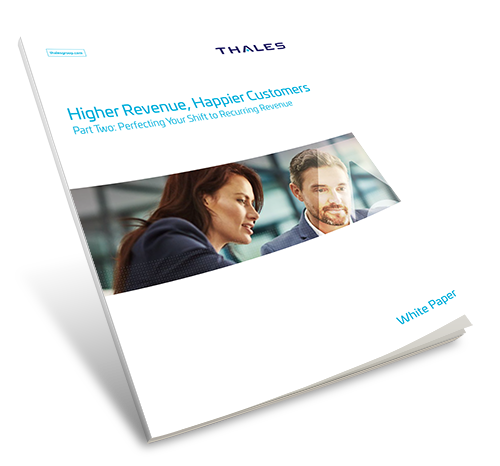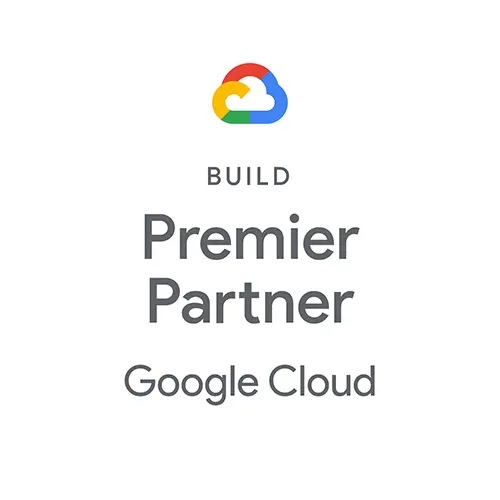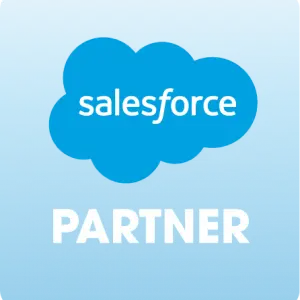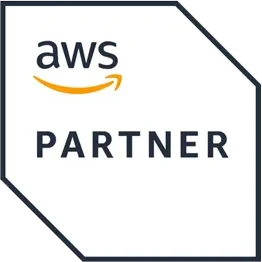Despite the dominance of subscription models, perpetual software is still a workable option for software sellers and buyers alike. Vendors benefit from stable revenue streams, customer loyalty, and upsell potential. Users appreciate the cost-effectiveness, control over upgrades, and sense of ownership that perpetual licenses offer.
In this article you’ll learn:
- How perpetual licenses work
- Why they are still sticky
- How to offer perpetual and subscription products in a streamlined product offering
What is a Perpetual Software License?
A perpetual software license is a software licensing model where the customer pays a one-time fee to access software indefinitely. The perpetual license never expires – once it is activated, it can be used forever.
The opposite of a perpetual software license is a subscription license. In a subscription license, the customer pays a smaller recurring fee to maintain access to the software. When the subscription license expires, access is revoked or paused until the user pays again.
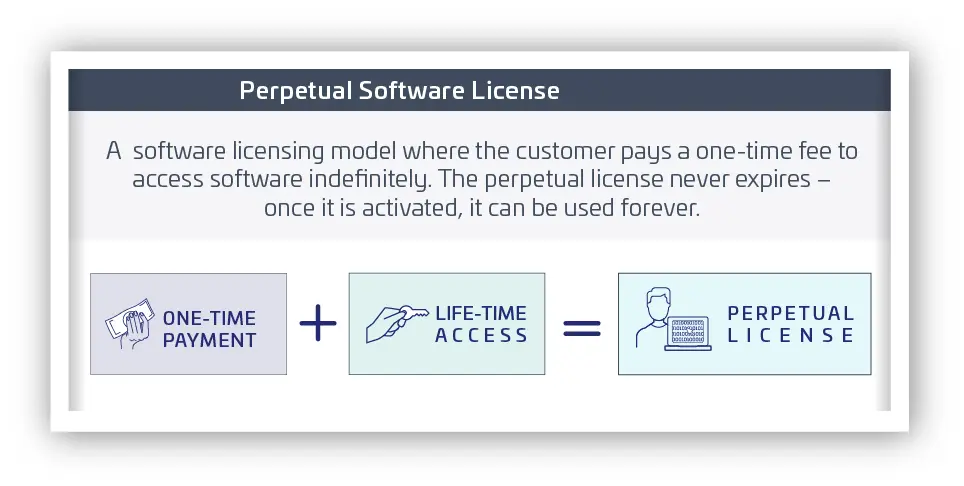
The perpetual software license is one of the simplest on the market. It treats buying software basically like buying any other commodity. Say you need a new washing machine. You go to the store, make the purchase, and it's yours. You might also buy a warranty and service package, which can be extended if you want more coverage. In that case, selling warranties and services are a part of the washing machine company’s revenue strategy.
A perpetual license model works the same way. Your customers pay a one-time fee for ownership of the software, but you can increase revenue by charging an annual fee to receive maintenance, support, and updates.
Although your customer will typically host the software on their own servers, licensing terms and conditions govern how the software can be used. A customer who buys perpetual licensees can use them indefinitely, but they still can’t copy, change, distribute, or access the software IP. Regardless of how you license and sell your software, any commercial software vendors must be able to enforce licensing terms and prevent misuse. It’s a critical aspect of protecting your intellectual property and preventing revenue loss due to overuse or misuse.
WHITE PAPER
Transitioning from large one-time sales models to relationship-based recurring revenue models can be a game-changer.
To learn more about maximizing recurring revenue for your business, download our latest whitepaper.
Benefits of Perpetual Software Licenses
From the Vendor Perspective
Advantages:
- Stable Revenue: Perpetual licenses provide upfront revenue, offering financial stability and predictability.
- Upsell Opportunities: Vendors can offer other services or upgrades to customers with perpetual licenses, generating extra revenue.
- Competitive Differentiation: Some buyers would rather not have to manage subscription licenses and are specifically looking for software they can buy once and that’s it. Offering perpetual licenses can differentiate a vendor from competitors who may only provide subscription-based models.
From the Customer Perspective:
Advantages:
- Cost Efficiency: Perpetual licenses can be more cost-effective in the long run for customers who plan to use the software for an extended period.
- Control Over Upgrades: Customers with perpetual licenses have more control over when they upgrade to new software versions.
- Ownership: Perpetual licenses give customers a sense of ownership over the software.
- Cost Predictability: Perpetual licenses lock in the price at purchase, providing cost predictability and avoiding potential price increases associated with subscription models.
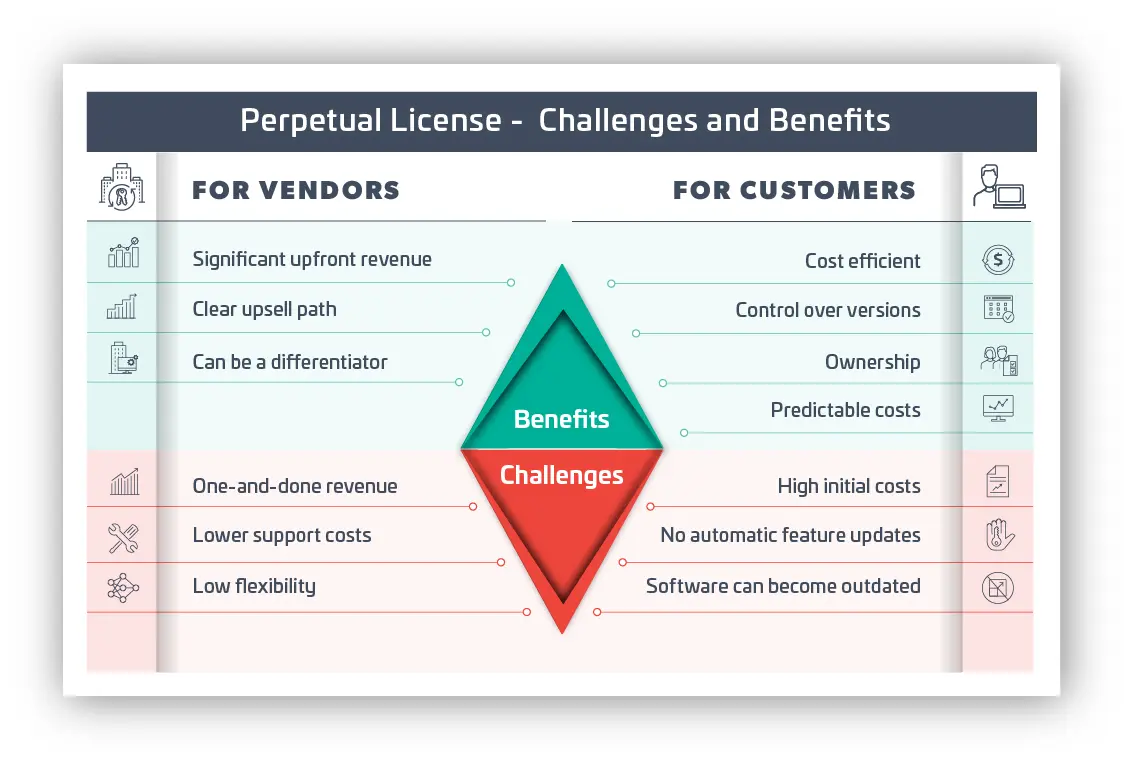
What is the Difference Between Perpetual and Subscription Licenses?
If you are considering shifting from selling your product perpetually to selling it on a subscription basis.
Payment
As discussed, in the perpetual model, payment is a one-time purchase with the possibility of a yearly maintenance fee. In the subscription model, payments are recurring (typically monthly or annually), with customers essentially renting the software.
Hosting
In the perpetual license model, customers often host the software on their servers. This may require a high level of customization or integration to meet the customer's needs. Software sold on a subscription basis is often sold as software as a service, or Saas, which is the combination of a cloud distribution approach and a subscription pricing approach.
Upgrades and Support
In the perpetual model, the initial purchase will include updates and support for a certain period. Vendors often monetize continued updates and support once the initial period has ended. In the subscription model, updates and support included in the ongoing subscription fee.
Security
Given that with perpetual software, customers usually host the software on their servers, customers will have more control over the security of data and usage of the product. Typically, security-sensitive products were only sold on perpetual licenses, although that is starting to change thanks to Thales’s security-licensing.
Software Categories Typically Sold Under Perpetual Licenses
On-Premises Enterprise Software:
What: This category includes software like ERP systems and CRM software businesses use for internal operations. Why: Perpetual licenses are favored for businesses' specific requirements and customization needs. Some companies prefer hosting these applications on their infrastructure for complete control over their software and data.
Operating Systems:
What: This category includes foundational software like Windows, macOS, and Linux that manages a computer's hardware and provides a user interface. Why: Operating systems are typically sold with perpetual licenses because users buy a license that is locked to the hardware it was originally installed on.
Security-Sensitive Products:
What: This category includes security-sensitive products like encryption software or secure communication tools. Why: End users in industries with stringent security requirements sometimes prefer to buy perpetual licenses. Perpetual licenses offer users greater control over the software, allowing them to maintain specific versions audited or approved for their security protocols. This control is critical for ensuring that the software meets their security standards and compliance requirements. If you sell security-sensitive products, moving to a subscription might not be the right choice.
On the other hand, just because your product deals with protected information does not mean you can’t find ways to monetize your software by selling through different license models. With ultra-secure Thales technology, even the most security-conscious companies can overcome typical challenges and sell their products through consumption or subscription license models. For a free consultation on how Thales can help, reach out to our team of experts here.
How Thales Powers All Types of Licensing
Maximizing Efficiency: Unified fulfillment for various licensing models
More and more often, the question is not either subscription or perpetual licensed software, it’s both.
The problem is your user will have to go through two vastly different deployment and onboarding experiences for two products they bought from the same vendor. Behind the scenes, your deployment and fulfillment rely on swivel chair processes and Excel sheets managed by interns. It’s easy to make mistakes, it’s hard to manage, and it’s impossible to scale.
You can overcome these challenges with proper licensing and entitlement management. With a robust licensing and entitlement management system, businesses can streamline their fulfillment processes and automate many tasks associated with managing different types of licenses. This improves efficiency and enhances the customer experience, ensuring that customers receive the right products and services promptly, regardless of the licensing model used.
Choosing the Right Licensing Model for Your Needs
Companies with security, deployment, or transformation concerns often struggle with software licensing. If want to avoid manual processes and complicated workarounds and achieve streamlined licensing no matter the product you sell, contact us.
We combine cutting-edge security with the most modern software licensing capabilities to provide any company in any industry with the ability to sell how their customers want to buy.
Visit our Software Monetization page to learn how Sentinel can help power your software revenue growth.
